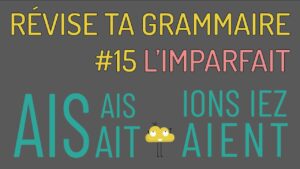Futur Proche vs Futur Simple Explained — Learn French in Context with Examples
- Hey, I thought I'd drop by!
- Je vais déjeuner !
- Uh. Can you say that again?
- Je... vais... déjeuner !
- Oh. I'm sorry. I'll come back later! Enjoy the restaurant!
- Restaurant?? Preposterous! I can cook a decent lunch by myself, thank you very much!
- But you just said...
- That I am...
- That you are going out to eat?
- That I am about to eat! Future tense!
- Wait, what? Isn't the French future tense just a regular kind of tense, with the... little thingies at the end?
- You mean the verb endings. Punaise, these summer holidays have taken a toll on your French grammar!
Going back to the start: the futur simple
- Yeah, that's the word I was looking for: endings. Like in the imparfait past tense!
- Tell me what you know about the future while I check on the pommes dauphines.
- Oooh, love them!
- Oh that's right, I forgot to invite you, Nostradamus...
- That's okay, I'll take a seat! Anyway, the French future? Super easy tense to spot and called "le futur simple". It's the equivalent of "will + verb" in English. It expresses, well, the future, and that's it. A pro tip to remember: instead of sticking the tense ending to the verb base, you stick it to the whole thing, namely the verb base with the infinitive ending still attached to it.
- Examplify.
- In the imparfait, you take off -er from parler, or -ir from finir, meaning that you keep only the stem as a base. And then you start conjugating: parl-ais, parl-ions; fin-issais, fin-issions... While in the "simple future tense", you don't take off anything:
| Personal pronoun | Parler in the futur simple | Finir in the futur simple |
|---|---|---|
| je | parler-ai | finir-ai |
| tu | parler-as | finir-as |
| il, elle, on | parler-a | finir-a |
| nous | parler-ons | finir-ons |
| vous | parler-ez | finir-ez |
| ils, elles | parler-ont | finir-ont |
- I see you almost don't need me anymore! Great explanation!
- Wow, thank you!
- Another perk of the futur simple is that it helps you remember the verb avoir in the present.
- What do you mean?
- Haven't you noticed how the futur simple's endings are actually the verb avoir in the present? Only the nous and vous forms are a little bit truncated (it's just -ons and -ez, just like in the present tense).
- Wicked! How come??
- Well, centuries and centuries ago, when people spoke Latin...
- Smell that? Are those your pommes dauphines burning?
FAQ: What is the futur simple in French?
The French futur simple expresses the future, just like "will + verb" in English. It has a straightforward set of endings (-ai, -as, -a, -ons, -ez, -ont) that attach to the infinitive form of the verb.
Le futur simple and irregular verbs
- So the future in French really is super easy!
- It is. Most of the time. Just like the imparfait, it may even turn irregular verbs regular. Or not: they may exhibit an irregular stem in the future tense.
- Any tips that I could lea--
- No. Just learn them by heart when they show up.
- No need to be snappy!
- Well, obviously my pommes dauphines interest you more than etymology.
- My, my. Well, as far as irregular verbs go, I know the futur simple conjugation for être, avoir and aller.
- The three pillars! The three French auxiliaries! Shoot!
| Être (to be) in the futur simple | Avoir (to have) in the futur simple | Aller (to go) in the futur simple |
|---|---|---|
| je serai | j'aurai | j'irai |
| tu seras | tu auras | tu iras |
| il, elle, on sera | il, elle, on aura | il, elle, on ira |
| nous serons | nous aurons | nous irons |
| vous serez | vous aurez | vous irez |
| ils, elles seront | ils, elles auront | ils, elles iront |
- Well done!
- Thanks. True enough, these three are "hardcore" irregular. They fall super far from their infinitive forms! I guess I need more practice.
- That's right. Why don't you watch this for a minute? It's great material to practice identifying être and avoir in the futur simple, as these kids use them a lot in their interviews! Also, do you hear...
- Those RRrr, RRrr at the end of almost every verb?
- Yup! The sweet sound of the future! Easy to spot with your eyes, easy to spot with your ears!
FAQ: How do you use the futur simple in French?
Anywhere where you'd use "will + verb" in English: when you talk about your plans for the holidays, something you commit to doing at a later time, or events that'll take place in a more distant future.
Le futur proche, DIY.
- Back to my coming uninvited and your reluctant invitation to lunch... I'm quite sure I didn't hear any futur simple ending when you told me about your lunch. It sounded more like... a present tense?
- That's because I was referring to a more immediate future, also known as "near future". It's one of the two French future tenses, and is widely used in spoken French.
- Uh oh... After the imparfait and the passé composé to talk about the past, now the futur simple and the futur proche??
- Well, these are certainly similar situations. Just like the passé composé, the futur proche involves a conjugated verb and a second verb that is not conjugated. The conjugated verb is in the present tense, but this time it's the verb aller (to go). It works as an auxiliary to the second verb, which is in the infinitive form and works as the main verb.
- Wait, what?
- I always forget the examples!
| Near Future Constructions | |
|---|---|
| je vais manger ma pomme | I'm going to eat my apple |
| tu vas regarder ta série | You're going to watch your TV series |
| Il va dormir | He's going to sleep |
| Nous allons appeler la police | We're going to call the police |
| Vous allez tomber! | You're going to fall! |
| Elles vont partir en randonnée | They're (feminine) going to go on a hike |
- Aah, thank you! Somehow it looks more simple than... the futur "simple"?
- Well check out this video. The guy in it kinda agrees with you. Basically, a native French speaker will find it okay to use the futur proche in most contexts, especially in spoken language. It's not so true the other way. But...
- French language is complicated?
- Yar.
FAQ: What is the futur proche in French?
The French futur proche expresses the near future, just like "to be going to + verb" in English. It involves aller (to go) in the present and a verb in the infinitive form.
The rules of the futur proche
- So, the French "near future" is kind of a compound tense?
- Yes... Uh, no! It's more like a "near future construction". The auxiliary and the infinitive verb do not bond as tightly as the auxiliary and the past participle in the passé composé.
- Those pommes dauphines are excellent!
- Merci!
- So what do you mean by "do not bond as tightly"? How come the French language always has to sound like a relationship??
- I mean that you can separate them with an object pronoun, which is a big deal grammatically. You can't do this with the passé composé: je l'ai mangé (I've eaten it) vs je vais le manger (I'm going to eat it)
| Near Future Constructions | |
|---|---|
| je vais le manger | I'm going to eat it (my lunch) |
| tu vas la regarder | You're going to watch it (your TV series) |
| Nous allons les appeler | We're going to call them (the police) |
- And in terms of irregular verbs...
- Not an issue: the verb aller itself is irregular...
- ... but the main verb will always be in its "dictionary", known infinitive form!
- Exactement.
- Okay so we've covered the conjugation, the main uses...but learning French taught me to be wary of French verbs. There ought to be more than a few differences between these two French future tenses!
- There are. It's not just a question of simple vs not simple as the guy above implied. These two folks in the next video wrap it all up for you.
- Right. So as my linguistic theory teacher would say, there's a question of... immediacy?
- Hmm hmm. The futur proche is closer to the present. It is connected to it somehow, hence the auxiliary in the present tense.
- And a question of language register?
- Oui ! The futur proche sure tends to be overused in contemporary, spoken French. In terms of storytelling, its "presentness" gives things a kick.
- And there's also a question of certainty? Like the futur proche expresses... more of it?
- Somehow. But to me, it's like the egg and the hen, and which came first. The futur simple is used to talk about the distant future, so things are bound to be less certain. As for the futur proche, it involves the verb aller, which literally means to go, to be on one's way. It gives a sense of willingness, of a decision being made about a future action. So it's bound to sound more certain!
- So do you think it was the egg or the hen?
- I don't care, I'll cook both.
FAQ: What's the futur proche used for in French?
The futur proche is widely used in spoken French. Its basic use is to talk about actions and events in the near future. It conveys a greater sense of immediacy and certainty than the futur simple.





